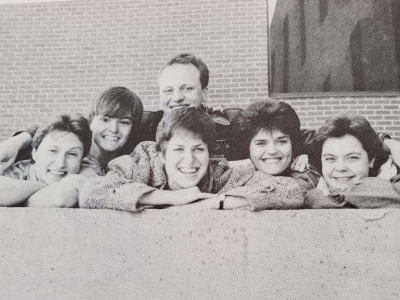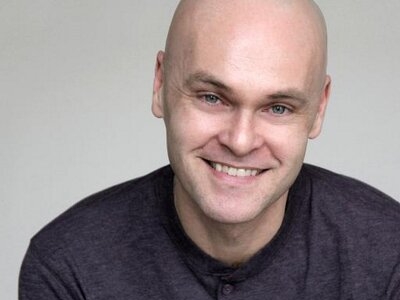 Stuart Adam, a graduate of Carleton University and a professor who helped to crucially shape the institution that had shaped him, died on Boxing Day following complications from a tumour of the brain. He was 79 years old.
Stuart Adam, a graduate of Carleton University and a professor who helped to crucially shape the institution that had shaped him, died on Boxing Day following complications from a tumour of the brain. He was 79 years old.
An inspiring teacher, an eloquent writer, an astute and perceptive intellect, the foremost scholar of journalism in Canada and a gifted academic administrator, his devotion to Carleton University spanned 60 years, from his first day as an undergraduate in the Journalism program in 1959 to his last breath as Professor Emeritus. Over his career he served as Director of the School of Journalism and Communication, Dean of Arts, and Provost of the university at a critical juncture in its history.
He was a warm and generous man who loved the company of lively minds and delighted in the play of bright conversation. To him, the lecture hall, the seminar room, and gathering with friends at the pub or over a meal were just points on the same continuum. There were ideas to be discussed and things to be learned, in ways that should be stimulating and enjoyable. He saw his duty as a professor and an administrative officer of the university as the protection and promotion of the institutional structures through which that conversation of ideas is conducted.
“He himself studied journalism in the humanist tradition, as a genre of social expression alongside literature and the arts, and as an essential element of the political conversation of democracy.”
He arrived at Carleton in 1959 at what was then still a small campus – the university was only 17 years old, younger than he was. He came from Toronto, drawn to a university that offered education in a new discipline: the skills and methods of responsible media coverage of the torrent of politics and commerce.
A natural athlete, he played hockey and tennis – he was especially good at tennis. By his final year he was editor of the campus newspaper, The Carleton. Upon graduation he spent three years with the Toronto Star as a reporter and desk editor, where he acquired a deep understanding of the culture of the newsroom and an appreciation for how, at its best, journalism could grip the imagination as it chronicled the facts of daily life. He would take that as his principal intellectual interest.
Tugged back to academics and to Carleton, he took his M.A. in Canadian Studies and then went on to doctoral work in Political Studies at Queen’s. While still a doctoral student, he began to teach in what was then the School of Journalism at Carleton, and in 1971 he joined the faculty as an assistant professor. A mere two years later, he was thrust into the role of Director of the School, a position he would occupy for the next 14 years.
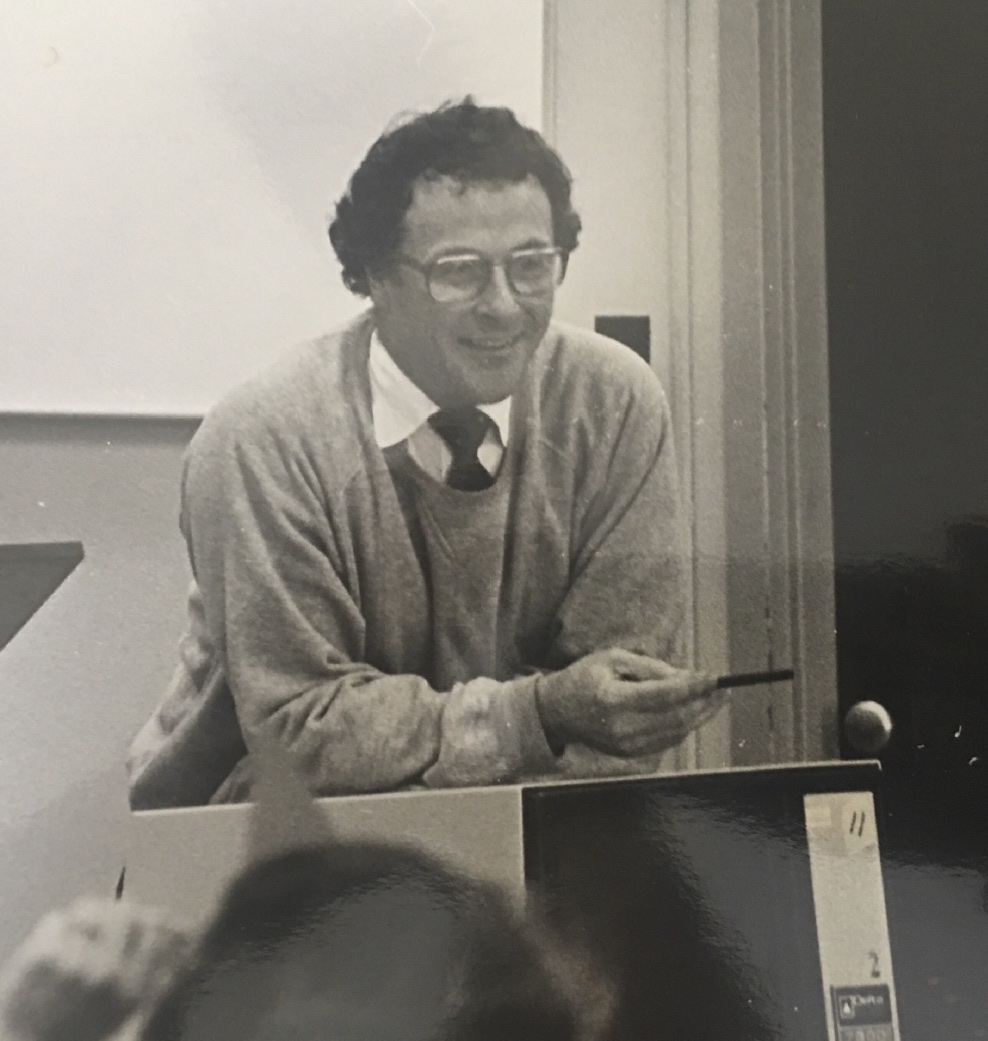 At the time, the Journalism program at Carleton enjoyed a reputation as a superior foundation for students seeking to enter the field, but beyond Wilfred Kesterton’s History of Journalism in Canada, it conducted little in the way of scholarly work on the news media and journalism practice. Stuart’s doctoral dissertation was on “The Press and its Liberty: Myth and Ideology in 18th Century Politics,” and he understood that, properly, a university program in Journalism should make the work of the media a subject of intellectual inquiry as well as instruction. There being no scholarly publication in Canada devoted to journalism practice, he was instrumental in the creation of the Carleton Journalism Review, which published from 1977 to 1980. It was under his direction that the School expanded its remit, adding courses on communication policy and practice – a stream of study that in 1978 became a degree in Mass Communication – and eventually changed its name to the School of Journalism and Communication.
At the time, the Journalism program at Carleton enjoyed a reputation as a superior foundation for students seeking to enter the field, but beyond Wilfred Kesterton’s History of Journalism in Canada, it conducted little in the way of scholarly work on the news media and journalism practice. Stuart’s doctoral dissertation was on “The Press and its Liberty: Myth and Ideology in 18th Century Politics,” and he understood that, properly, a university program in Journalism should make the work of the media a subject of intellectual inquiry as well as instruction. There being no scholarly publication in Canada devoted to journalism practice, he was instrumental in the creation of the Carleton Journalism Review, which published from 1977 to 1980. It was under his direction that the School expanded its remit, adding courses on communication policy and practice – a stream of study that in 1978 became a degree in Mass Communication – and eventually changed its name to the School of Journalism and Communication.
He himself studied journalism in the humanist tradition, as a genre of social expression alongside literature and the arts, and as an essential element of the political conversation of democracy. He edited the 1976 anthology Journalism, Communication and the Law, which became for years the standard university text in the discipline and to which he contributed the seminal chapter on “The Journalistic Imagination.” Over his career, he produced a number of works that interrogated and informed journalism practice, including the comprehensive Sourcebook of Canadian Media Law (with Robert Martin), Journalism: The Democratic Craft (with Roy Peter Clark), and the elegant volume Notes Towards a Definition of Journalism.
“The Carleton University that exists today – confident, intellectually energetic, and financially secure – owes itself to the implementation of the design for renewal that Stuart Adam oversaw.”
He was especially fascinated with the work of American communication scholar James Carey, with whom he became fast friends. They shared much in common, including a keen interest in the place of journalism in the democratic project and how journalists should be educated, but perhaps especially a love of spirited and informed debate. Toward the end of his career, Stuart wrote extensively on Carey’s work and judged a book contest named in his memory.
Along with his teaching and research, he continued to work as a journalist, notably as a consultant and producer of the 10-part CBC documentary series Lawyers, editorial director for a project that became Patrick Watson’s CBC series on The Struggle for Democracy, and production consultant on the CBC documentary “Rights and Freedoms.”
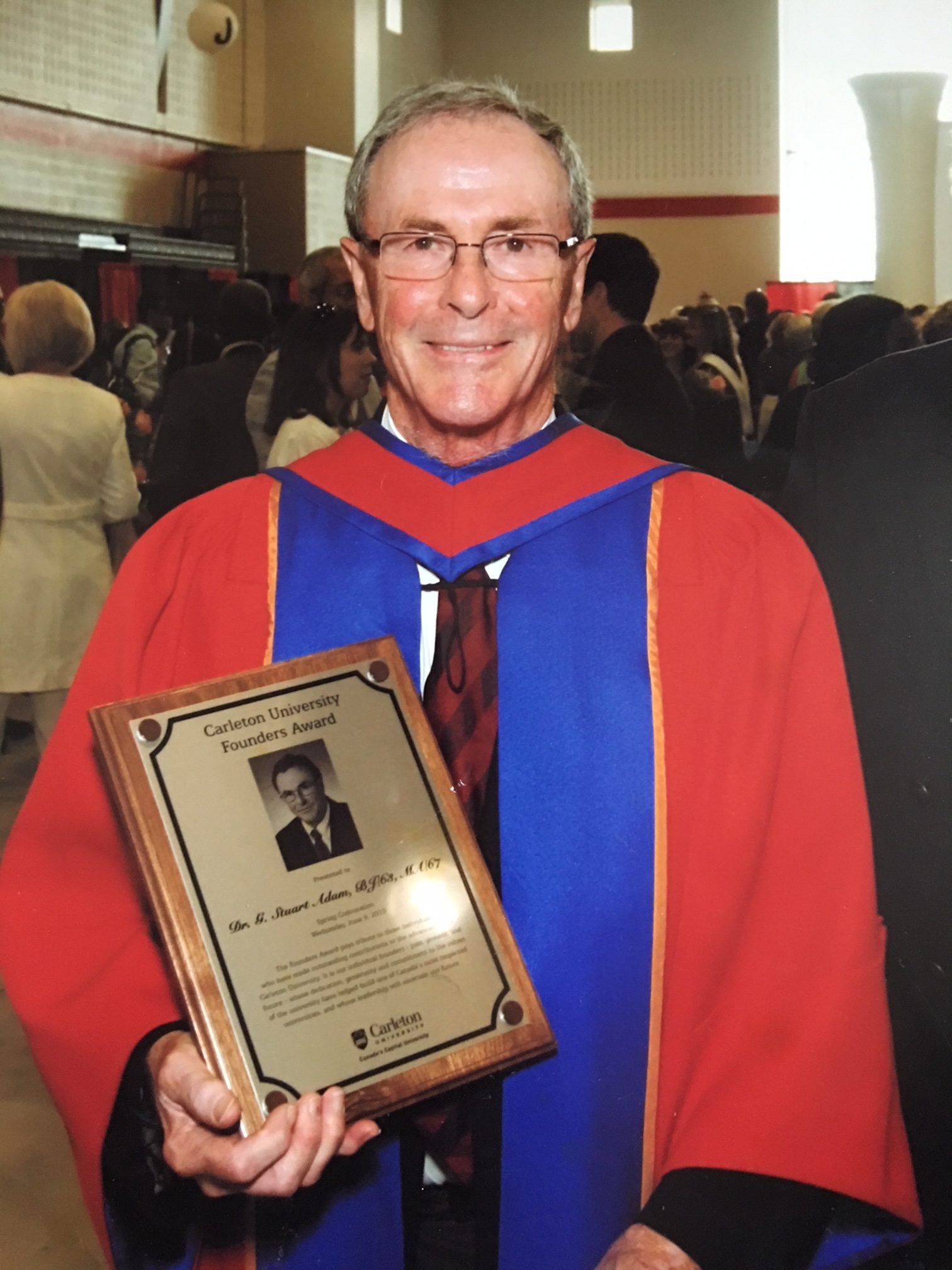 In 1987, he took up a two-year post at the University of Western Ontario, where he was Visiting Professor and Chair of the Centre for Mass Media Studies. Shortly after his return to Carleton he became Dean of the Faculty of Arts. It was then that the university entered a period of turbulence in which its reputation suffered and its financial footing was compromised. In 1996, a new President, Richard Van Loon, appointed Stuart chair of the Working Group on Academic Renewal, which over the span of five months produced a blueprint for the reinvigoration of the institution. In 1997, Stuart was appointed Provost and Vice-President (Academic) in order to put the plan into action. The Carleton University that exists today – confident, intellectually energetic, and financially secure – owes itself to the implementation of the design for renewal that Stuart Adam oversaw.
In 1987, he took up a two-year post at the University of Western Ontario, where he was Visiting Professor and Chair of the Centre for Mass Media Studies. Shortly after his return to Carleton he became Dean of the Faculty of Arts. It was then that the university entered a period of turbulence in which its reputation suffered and its financial footing was compromised. In 1996, a new President, Richard Van Loon, appointed Stuart chair of the Working Group on Academic Renewal, which over the span of five months produced a blueprint for the reinvigoration of the institution. In 1997, Stuart was appointed Provost and Vice-President (Academic) in order to put the plan into action. The Carleton University that exists today – confident, intellectually energetic, and financially secure – owes itself to the implementation of the design for renewal that Stuart Adam oversaw.
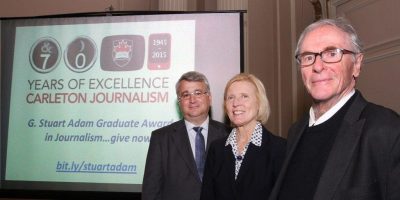 He retired in 2004 and took up a position as Visiting Professor at the Poynter Institute for Media Studies in St. Petersburg, Florida, but he inevitably returned to Canada and to Carleton. He kept an office in the School of Journalism and Communication where he read and wrote until Parkinson’s disease made that no longer possible. In 2015, Nik Nanos, Chair of the university’s Board of Governors, spearheaded the creation of the G. Stuart Adam Graduate Award in Journalism.
He retired in 2004 and took up a position as Visiting Professor at the Poynter Institute for Media Studies in St. Petersburg, Florida, but he inevitably returned to Canada and to Carleton. He kept an office in the School of Journalism and Communication where he read and wrote until Parkinson’s disease made that no longer possible. In 2015, Nik Nanos, Chair of the university’s Board of Governors, spearheaded the creation of the G. Stuart Adam Graduate Award in Journalism.
– Chris Dornan, School of Journalism and Communication
